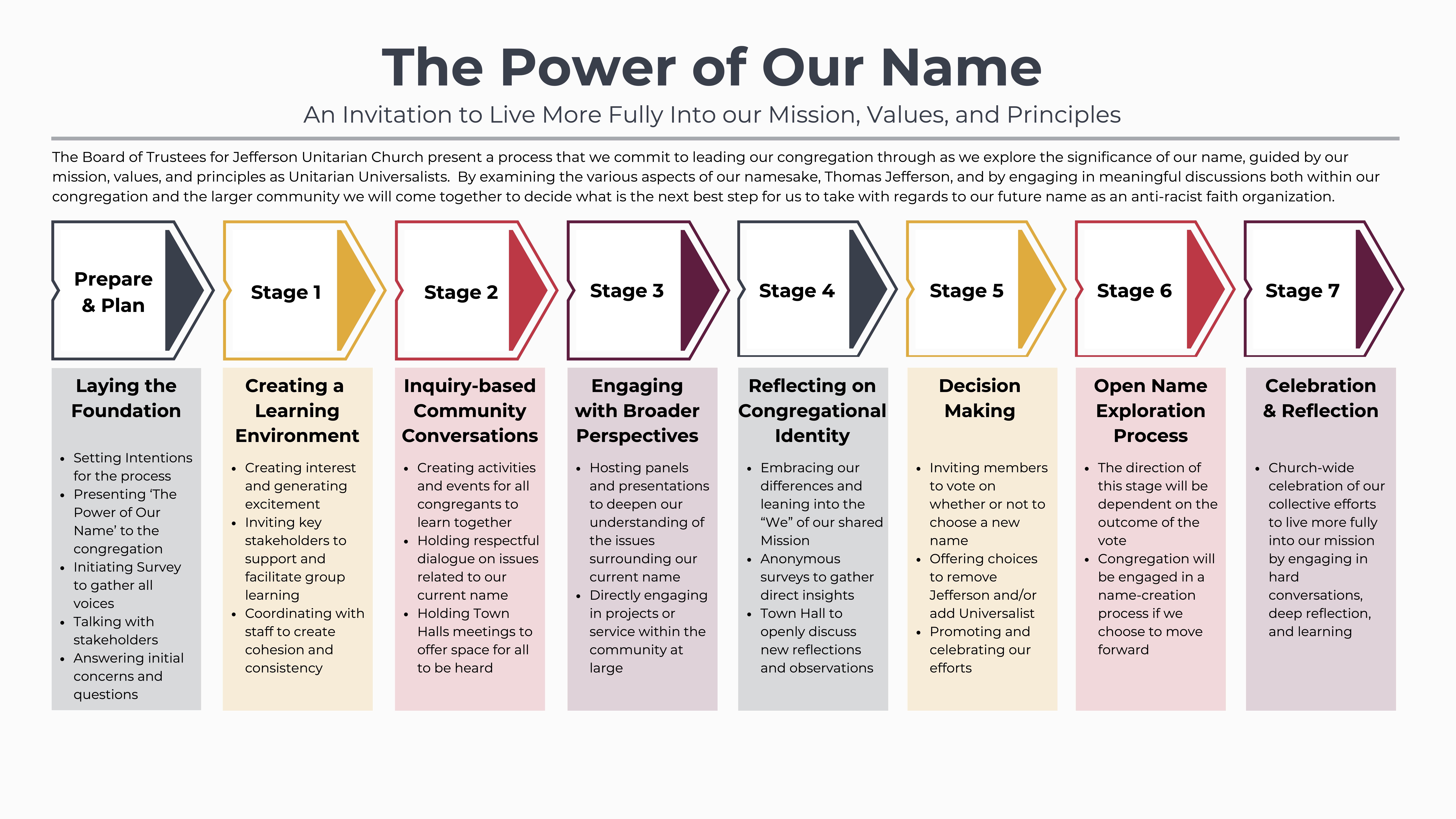The Board of Trustees for Jefferson Unitarian Church present a process that we commit to leading our congregation through as we explore the significance of our name, guided by our mission, values, and principles as Unitarian Universalists. By examining the various aspects of our namesake, Thomas Jefferson, and by engaging in meaningful discussions both within our congregation and the larger community we will come together to decide what is the next best step for us to take with regards to our future name as an anti-racist faith organization.
The Power of Our Name: An Update from the Board of Trustees
Thank you for your continued engagement in this important process. As your Board of Trustees, we want to share the outcomes of our Summer naming exercise, Dot Voting, what we’ve learned so far, and next steps.
The dot voting exercise revealed two main perspectives from our community:
1. For some, it was energizing to see possibilities rise to the top and to imagine our future name.
2. For others, the list feels incomplete—something essential about our congregation still seems to be missing.
From the 216 names submitted, clear themes emerged that reflect who we are:
- Place & Belonging
- Journey & Growth
- Connection & Community
- Justice & Compassion
- Light & Spirit
- Tradition & Legacy
- Joy & Celebration
The Top Ten names from Dot Voting were:
- Table Mountain
- Journey
- Rocky Mountain
- All Peoples
- Spirit of Life
- Two Mesas
- Mountain Light
- Trailhead
- Common Flame
- Beacon
These themes connect directly to our mission of nurturing religious community and to the “nested bowls” we created as a congregation to guide our faith exploration. While these names give us strong material to work with, they also raise important questions we need to explore together:
- How well do these names represent our principles, mission, and values?
- Do they distinguish us as a Unitarian Universalist congregation in the larger community?
- How should we address our mixed feelings about religious language?
- What message will this name give to people seeking a spiritual home?
Leadership of the Board and Ministerial Teams are in agreement that:
- Our future name should stand strong on its own, not rely on an acronym.
- It should welcome current members and warmly invite newcomers through our doors.
- We must take the time needed for clarity, without exhausting the community or rushing toward a decision.
In order to move forward, we will hold:
- Community Conversations: We’ll gather to reflect on these questions, build on the work we’ve already done, and refine our vision for what the name should express. Dates are to be determined; stay tuned for more info!
- Congregational Meeting: This will be a check-in on The Power of Our Name. The Racial Justice Team will also share updates from the history project during the meeting. A final vote will be postponed until after the holidays, allowing time for deeper discernment. The Fall Congregational Meeting will be held on Sunday, November 9.
The Power of Our Name: Qualifying Rounds
Now that our congregation has voted to change our name, submitted many wonderful new name ideas, and formed a naming committee, the next step is to narrow down the list of potential names for our church through qualifying rounds.
After service on Sunday, August 17 and Sunday, August 24, we will participate in this next step. The purpose of this step is to get member input as we narrow down the list of names put forth by members of our congregation. Members are welcome to either participate in-person, through dot voting,* or through voting in the online survey.
*What is dot voting? If you’re a member of the church and you’d like to participate in dot voting, you will receive a slip with four (4) dot stickers. You’ll also receive a numbered list of names to vote on. These are the names that remain after our naming committee has carefully cross-checked each name submission against our naming guidelines and compatibility. In the south commons, you’ll find each name on your list, printed on a poster, with its corresponding number. Place your dots on the poster(s) displaying the name or names that your love. All four dots can be placed on one poster if you decide that’s your favorite.
Dot-voting participants are also encouraged to write their own thoughts and opinions on the post-it notes provided at the tables. When pondering each of the name options:
- Focus on the feelings, images, or emotions that each name evokes in you. Things like: alignment with our values, our mission, spiritual elements, and UU elements.
- Consider pros and cons for each name.
- Talk with others and capture key comments on post-its, if desired.
- Be sure your individual likes, dislikes, joys, and concerns are written on post-it notes.
To simplify this process of considering what our new name should be, the words “church” or “congregation” have intentionally been left off. In these first qualifying rounds, we wanted to focus on the name without complicating your decision or influencing your vote due to a preference for one over the other. Please know, the final name will include “Unitarian Universalist”, either as an extension of the name itself or as a tagline (i.e. NAME: A Unitarian Universalist Church/Congregation).
Members who would like more time to contemplate each name in our qualifying rounds are encouraged to participate in the process online. Please use the button below to use fill out the digital form.
Qualifying Rounds Name List:
| 1. All Peoples |
| 2. All Welcome |
| 3. Aspire |
| 4. Beacon |
| 5. Beloved |
| 6. Beloved Souls |
| 7. Bridges of Compassion |
| 8. Common Flame |
| 9. Cottonwood |
| 10. Covenantal |
| 11. Doors Open |
| 12. Ember |
| 13. Embracing Souls |
| 14. Encompassing |
| 15. Equal Heart |
| 16. Faith |
| 17. Harvest |
| 18. Journey |
| 19. Living Tradition |
| 20. Love at The Center |
| 21. Mountain Light |
| 22. Open Arms |
| 23. Open Circle |
| 24. Open Heart |
| 25. Peace |
| 26. Prospect |
| 27. Rocky Mountain |
| 28. Sacred Flame |
| 29. Sacred Grove |
| 30. Spirit of Life |
| 31. Standing Oaks |
| 32. Summit |
| 33. Summit Sanctuary |
| 34. Table Mountain |
| 35. Tapestry |
| 36. The Grove |
| 37. Threshold |
| 38. Trailhead |
| 39. Turning Light |
| 40. Two Mesas |
| 41. Welcoming Circle |
| 42. Western Flame |
Choosing Our New Name
The congregation has voted to choose a new name. The following outline includes major themes and events that will be scheduled from June through October/November of 2025:
Creating a Naming Committee
This process will be guided by established lay leaders on the Board and Shared Mission Team, but will largely be led by our members. If you are interested in joining this committee, please read the expectations and requirements. You can then submit a statement of interest to the BOT for consideration. Please include what interests you about being on the committee, and what gifts you bring to the team.
Welcoming Name Submissions
June will be a month of both celebration and creativity. We will invite individuals to submit their name ideas, both electronically and in-person, while also celebrating all that JUC means to us. What words come to mind when you think of our Beloved Community? What images or metaphors would you use to describe what this place means to you?
Offering Rank Choice Voting to Members
After name submissions have been collected, our members will be provided the opportunity to view the list and vote on their favorites. This process is intended to generate excitement about all the possibilities, providing you the opportunity to make known what you like best.
Exploring Names Through Community Conversations
The top 5 favorite names will be presented to members in a community forum, where members of the Naming Committee and Board will facilitate small group discussions for each participant to share what they like and do not like about each proposed name. Data from these discussions will be used by the Naming Committee to narrow down the choices for the Board to vote on and present to members at the Fall Congregational Meeting.
Voting for Our Name at the Fall Congregational Meeting
With mid-October to early November as our target date range, the Board of Trustees will host a Congregational Meeting in partnership with the Naming Committee to share the results of this process. Members will be provided the opportunity to vote on the name that you, our Beloved Community, worked together to create.
This process will be adjusted as needed as we move forward together, allowing us to adapt to the needs of our congregation by adding additional workshops or discussions as needed.
Requirements for The Power of Our Name Naming Committee
Members interested in being on the Naming Committee are asked to submit a statement of interest (100-300 words) to the Board of Trustees, answering the following questions:
- Describe your interest and desire to be a part of the Naming Committee.
- What perspectives, gifts, skills, or talents will you bring to the team?
Criteria for submitted interest:
- Must be a Member (6+ months)
- Agreement to the following expectations:
Expectations
- Must be able to work collaboratively with a group of other members
- Must uphold the Covenant of Respectful Relationships
- Must be available through the summer
- There will be more intentional work during transitions in the process, currently scheduled over the weeks of June 30th, July 28th and August 4th, however, exact dates TBD. Work may be planned to be done both remotely and in person, depending on the project.
- Ability to support and respect different opinions and ideas
- Ability to dedicate 2-5 hours per month
- Interest and ability to join virtual Zoom calls
- OPTIONAL: Interest in facilitating small group discussions
Frequently Asked Questions
The JUC Board of Trustees has encountered several frequently asked questions throughout The Power of Our Name process so far. They have compiled a list of these questions, and thoughtfully answered each of them. You can view this list of questions and answers by visiting the link below.
October 13, 2024:
The Process Plan

